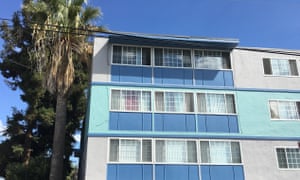Low-income families face eviction as building ‘rebrands’ for Facebook workers

A Silicon Valley apartment complex wants to attract high-income tenants who work at top tech firms but critics ask, what is the human cost?

The recent eviction notice that Laura Hernandez and her husband received at their one-bedroom apartment in Silicon Valley did not say why they were being kicked out.
But executives at Trion Properties, a private equity firm that recently purchased their building, have made it unusuallyclear that they want a different kind of tenant high-paid technology workers at the nearby headquarters of Facebook, which is planning a large campus expansion.
In Hernandezs building in Redwood City, many residents threatened with eviction are low-income Latino families.
Hernandez takes care of her three-month-old daughter while her husband Adan Estevez works at a nearby recycling center. They pay their $1,600 rent on time. With less than two weeks before she has to move out, Hernandez, 26, has become worried that her anxiety over the possibility of being homeless is hurting her baby.
Because I breastfeed my daughter, I feel like Im passing that stress and depression on to her, she said during an interview in Spanish. Were not asking for a place to live for free. We just need a little more time.
Housing advocates say that throughout Silicon Valley, where income inequality is on the rise, real estate investors are increasingly purchasing centrally located apartments, remodeling them, removing low-income tenants en masse, and replacing them with wealthy tech workers. In many cases, the house flipping is entirely legal and occurs with little objection from local officials.
While stories of indirect displacement in the tech economy have become commonplace in California, Trions marketing materials are exceptionally transparent in the way they state the objectives of rapid gentrification to turn a profit.
The firm, in announcing the purchase of the 48-unit Buckingham Apartments, said that its goal was to rebrand and revitalize the property, raise the rents, and attract young working professionals employed at Google, Facebook, and other Fortune 100 tech companies.
This is a blatant attempt to displace people, said Salimah Hankins, senior staff attorney with Community Legal Services in East Palo Alto, a nonprofit representing some of the evicted tenants. This is all about a great investment opportunity. Theres no understanding of the real human cost.
Her organization has seen similar cases of displacement throughout Redwood City and in the neighboring cities of San Mateo and Burlingame.

The three-storey building at 180 Buckingham Avenue in Redwood City is located five miles from the Facebook headquarters, 10 miles from Google, 20 miles from Apple, and a short drive away from many other tech startups contributing to seismic demographic shifts in the region.
Prior to Trions $15m purchase of the property, rents were 40% below market value, the company said in a press release, noting that it presented an opportunity … to maximize rent growth.
Trion also noted that Facebook has offered its employees $10,000 and $15,000 bonuses if they live within ten miles of campus, helping make Redwood City a new hub for tech employment.
So far, Trion has sent eviction notices to 15 units to clear the way for renovations, said managing partner Max Sharkansky. The remaining apartments will be remodeled over time, which means its expected that most tenants will eventually lose their homes.
While rents will be increasing at this property, we would, of course, be delighted to have the original residents come back to this building as residents in the renovated units if they would like to, Sharkansky said in a statement.
The new landlords have refused to offer any financial assistance for relocation or additional time to secure new housing, according to Hankins.
Numerous studies have shown that, although the region depends on low-wage service workers who support the tech economy, only the ultra-wealthy can afford to live near their jobs. In Silicon Valley, roughly 70,000 low-income workers now commute more than 50 miles to work.
In recent months, even well-off tech workers have publicly stated that they can no longer afford to live comfortably and raise families in northern California.
Facebook did not respond to a request for comment on the Redwood City evictions, though the company has in the past pledged to invest about $5m toward several regional housing initiatives. But critics argue that the social media corporation and other tech companies need to make much more substantial investments to offset displacement.
Others have argued that local governments have consistently failed to pass laws that protect tenants and must do more to encourage the production of new housing.
When Hernandez showed up at a recent San Mateo County board of supervisors meeting to ask for help, officials said there was little they could legally do, except try and encourage the property owner to delay.
Mass eviction cases, like a recent one in San Jose, considered the largest in the region, sometimes spark controversy. But it is the small-scale evictions happening on a daily basis that play a significant role in what has become a displacement crisis, said Miriam Zuk, project director of the University of California, Berkeleys Urban Displacement Project.
Zuk said she now regularly sees direct evidence of the tech impact on housing, citing one case in which a property owner evicted a group of Latino residents to make way for the laptop crowd. In Oakland, where Uber is opening a new office, everybody is now advertising housing in terms of its proximity to Uber, she said. Its crazy how quickly that happened.
Dora Diaz, a 37-year-old Buckingham Apartments tenant, said she doesnt know what she will do if she receives an eviction notice.
I get nervous just even thinking about opening the door, because Im scared Im going to see the paper, she said while her three-year-old son Gael played nearby. I feel like its only a matter of time.

Her neighbor Eduardo Murillo, 40, said he lives with his brother and cousin in a one-bedroom and that they havent been able to find anywhere affordable in advance of their October eviction.
Were very stressed. Everyone deserves to have somewhere affordable.
Mariana Jimenez, a 39-year-old tenant who lives with her brother and his two children, broke down crying while discussing their search for a new place before they are forced to leave in October.
We are looking and making a lot of appointments but its all very expensive, said Jimenez, who works as a nanny. Someone needs to help us.
Read more: https://www.theguardian.com/technology/2016/sep/21/silicon-valley-eviction-facebook-trion-properties